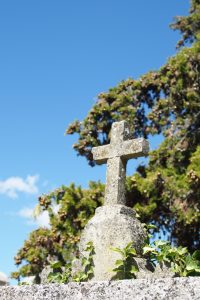Legacy and Planned Giving
 Now is the best time to start planning for the end of life. It doesn’t matter how old or young you are. Helping people face death is one of the most sacred responsibilities of the Church. Planning for the end of life is equally as important as planning for birth. While it can be difficult to start conversations about preparing for the end of life, it is much easier to take care of these things when life is not in crisis mode or if death comes suddenly. The church is here to help you through the process. You should have your final wishes made known and placed on file with the church. It is important that death be a thoughtful part of a discussion with family and/or friends prior to the actual experience.
Now is the best time to start planning for the end of life. It doesn’t matter how old or young you are. Helping people face death is one of the most sacred responsibilities of the Church. Planning for the end of life is equally as important as planning for birth. While it can be difficult to start conversations about preparing for the end of life, it is much easier to take care of these things when life is not in crisis mode or if death comes suddenly. The church is here to help you through the process. You should have your final wishes made known and placed on file with the church. It is important that death be a thoughtful part of a discussion with family and/or friends prior to the actual experience.
Possessions and how we use them have a way of defining who we are and what we value. The same could be said with how we decide who to give them to after we die. Consider the organizations you have supported during your life, especially your church, and how you will continue to support them with your legacy is part of a mature faith.
2020 Winter Webinar Series: Stewardship and End of Life
How do we prepare well for end of life, knowing that preparing allows us to make sound decisions, decreases our anxiety, and helps us align our beliefs and values with our final wishes. What is the role of churches in this work?
Recordings and Powerpoint presentations of our winter webinar series are provided below
Why Pre-Plan?
What are our cultural attitudes about dying that keep us from preparing for death? Why is planning important? What type of preparations are important?
Suggested audience: clergy, vestry members, and people of all ages interested in learning more about this topic
Guest presenter: The Rev. Charlie Brumbaugh, St. John the Baptist, Breckenridge. Charlie has been an Episcopal priest for 33 years, and the Rector of St. John the Baptist Episcopal Church in Breckenridge since January, 2016.His abiding interest in encouraging people to prepare for death and burial began when his father suffered an unexpected stroke at age 52, and died six months later. His primary goal is to invite each and every adult to prepare for their own death and burial NOW. This brings peace of mind to us in the present, and one day will be an immeasurable gift of love for our family and friends at the time our death.
View “Why Pre-Plan?” webinar recording >
Why Preplan? presentation for downloading >
Planning throughout the Year
How does the liturgical calendar help us frame conversations about preparing for dying? How can churches help people become less anxious and more prepared? What are planned gifts and how do they allow individuals to continue to live out our beliefs and values at the end of life?
Suggested audience: clergy, vestry members, and anyone interested in learning more about this topic
View “Planning throughout the Year” webinar recording >
Planning throughout the Year presentation for downloading >
Doing Planned Giving Well
Most churches want to incorporate planned giving into their overall stewardship efforts. How can we equip ourselves to do this work well: understanding the language, meeting regulatory requirements, keeping records, and celebrating gifts?
Suggested audience: clergy, vestry members, finance committees, treasurers
Guest presenter: Scott Asper, Executive Director, Colorado Episcopal Foundation
View “Doing Planned Giving Well” webinar recording >
Doing Planned Giving Well presentation for downloading >
Planning for End of Life
- Twenty-five Things You Need before You Die is a list of documents you should have on file in preparation for dying.
- Planning for the End of Life is a helpful guide for putting in place wills and other directives for the end of life.
- Twelve Questions to Ask Your Aging Parents is a list of questions that can help you, your siblings, and your parents begin to plan ahead. While preparing for your own retirement, people in their 50s and 60s often take on a new role as caretakers for their aging parents.
- Research has shown that patient-physician discussions result in a higher quality of life for patients and their family caregivers facing the end of a life. Why End-of-Life Planning Is Smart, Necessary talks about what these discussions provide and how they help.
- The following websites provide additional resources:
- Aarp.org provides comprehensive information and services for seniors, and information about support groups and various publications. They will also direct you to information about Colorado Advance Medical Directives and Medical Durable Power of Attorney.
- Getyourshittogether.org says “Should the ground fall out from under your feet, plan now for a softer landing.”
- The Rev. Charlie Brumbaugh from St. John the Baptist Episcopal Church, Breckenridge, provides knowledge and expertise on the many non-financial aspects of planning for end of life. Reach out to him at CFBrumbaugh@gmail.com or 1.970.453.4264. He also offers the presentation and/or workshop “Last Things” to congregations and other groups.
- The Episcopal Church Foundations says “…an active planned giving program is a vital ministry that offers church members the opportunity to make a final testament about the importance of their Christian faith, and can help ensure resources will be available in the future to do the important work of the Church. Resources for Planned Giving provides information and materials that can help you get started or improve your current program.
Recommended Books for Second Half of Life
Falling Upward by Richard Rohr helps readers understand the meaning and tasks of the two halves of life and how it is in the second half that we come to spiritual richness and fullness of life.
Joan Chittister’s The Gift of Years: Growing Older Gracefully reframes what “getting old” really means: “Old age is not when we stop growing. It is exactly the time to grow in new ways. It is the period in which we set out to make sense of all the growing we have already done. It is the softening season when everything in us is meant to achieve its sweetest, richest, most unique self.”
Information Sheets
Life Insurance Options for Charitable Donations to Your Church
